![]()
Suggested Reading
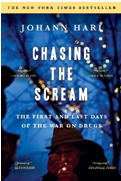 Chasing the Screamis a well-researched and excellent read on the failed 100 year drug war, which among other things caused drugs to became more expensive, it also meant addicts had to start committing small crimes to pay for their addiction. What we now think of as junkie who spends their days stealing and prostituting is a product of the war on drugs. Cheap, legal drugs allowed addicts to live somewhat normal lives, but after their criminalization, they started quitting jobs and obligations so they could support the addiction. It also has increased violence because of the risky nature of drug dealing. Because they can’t turn to law enforcement, gangs must have a violent reputation to make potential robbers afraid to mess with them. When law enforcement takes out dealers in the chain, another dealer quickly replaces them. Several countries including Canada, Switzerland, Portugal and Paraguay have shown that there are more effective ways that treat addiction as the illness it is with compassion and leave the stigma and shame that drives more addiction behind.
Chasing the Screamis a well-researched and excellent read on the failed 100 year drug war, which among other things caused drugs to became more expensive, it also meant addicts had to start committing small crimes to pay for their addiction. What we now think of as junkie who spends their days stealing and prostituting is a product of the war on drugs. Cheap, legal drugs allowed addicts to live somewhat normal lives, but after their criminalization, they started quitting jobs and obligations so they could support the addiction. It also has increased violence because of the risky nature of drug dealing. Because they can’t turn to law enforcement, gangs must have a violent reputation to make potential robbers afraid to mess with them. When law enforcement takes out dealers in the chain, another dealer quickly replaces them. Several countries including Canada, Switzerland, Portugal and Paraguay have shown that there are more effective ways that treat addiction as the illness it is with compassion and leave the stigma and shame that drives more addiction behind.
 Recovery 2.0 shows that full recovery has to be sought on multiple levels: physical, mental, emotional, spiritual,and even social. Do not read this book if you want an easy fix. Tommy delivers something much more real than that:clarity, profound honesty, and a path to live by.He astutely summarizes what we may call the universal addiction story that, in one form or another, represents theworldview of every addicted person: “I am not getting what I need in my life and I do not know how to get it. I feelthe world has let me down. No one seems to recognize or understand me.” In short, my life is unlivable. I cannotlive it, only escape it.A great strength of this book, apart from the lucid, engaging, utterly honest, and self-revealing way it is written, ishow clearly it illuminates and casts fresh light on familiar forms of treatment, in particular the 12 Steps. If youthought you knew and understood the 12 Steps, no matter whether you celebrated or critiqued them, I invite you tosuspend your opinions until you read through Tommy’s refreshingly candid discussion. It is penetrating in the mostpositive sense.
Recovery 2.0 shows that full recovery has to be sought on multiple levels: physical, mental, emotional, spiritual,and even social. Do not read this book if you want an easy fix. Tommy delivers something much more real than that:clarity, profound honesty, and a path to live by.He astutely summarizes what we may call the universal addiction story that, in one form or another, represents theworldview of every addicted person: “I am not getting what I need in my life and I do not know how to get it. I feelthe world has let me down. No one seems to recognize or understand me.” In short, my life is unlivable. I cannotlive it, only escape it.A great strength of this book, apart from the lucid, engaging, utterly honest, and self-revealing way it is written, ishow clearly it illuminates and casts fresh light on familiar forms of treatment, in particular the 12 Steps. If youthought you knew and understood the 12 Steps, no matter whether you celebrated or critiqued them, I invite you tosuspend your opinions until you read through Tommy’s refreshingly candid discussion. It is penetrating in the mostpositive sense.
The Spirituality of Imperfection: Storytelling and the Search for Meaning by Ernest Kurtz & Katherine Ketcham. I Am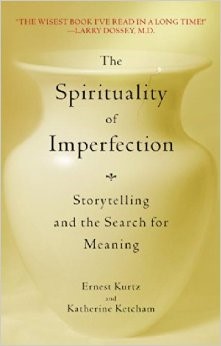 Not Perfect is a simple statement of profound truth, the first step toward understanding the human condition, for to deny your essential imperfection is to deny yourself and your own humanity. The spirituality of imperfection, steeped in the rich traditions of the Hebrew prophets and Greek thinkers, Buddhist sages and Christian disciples, is a message as timeless as it is timely. This insightful work draws on the wisdom stories of the ages to provide an extraordinary wellspring of hope and inspiration to anyone thirsting for spiritual growth and guidance in these troubled times. Who are we? Why so we so often fall short of our goals for ourselves and others? By seeking to understand our limitations and accept the inevitably of failure and pain, we being to ease the hurt and move toward a greater sense of serenity and self-awareness. The Spirituality of Imperfection brings together stories from many spiritual and philosophical paths, weaving past traditions into a spirituality and a new way of thinking and living that works today. It speaks so anyone who yearns to find meaning within suffering. Beyond theory and technique, inside this remarkable book you will find a new way of thinking, a way of living that enables a truly human existence.
Not Perfect is a simple statement of profound truth, the first step toward understanding the human condition, for to deny your essential imperfection is to deny yourself and your own humanity. The spirituality of imperfection, steeped in the rich traditions of the Hebrew prophets and Greek thinkers, Buddhist sages and Christian disciples, is a message as timeless as it is timely. This insightful work draws on the wisdom stories of the ages to provide an extraordinary wellspring of hope and inspiration to anyone thirsting for spiritual growth and guidance in these troubled times. Who are we? Why so we so often fall short of our goals for ourselves and others? By seeking to understand our limitations and accept the inevitably of failure and pain, we being to ease the hurt and move toward a greater sense of serenity and self-awareness. The Spirituality of Imperfection brings together stories from many spiritual and philosophical paths, weaving past traditions into a spirituality and a new way of thinking and living that works today. It speaks so anyone who yearns to find meaning within suffering. Beyond theory and technique, inside this remarkable book you will find a new way of thinking, a way of living that enables a truly human existence.
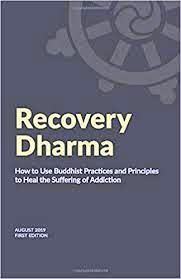 Recovery Dharma is the text used for the a peer-led, grass-roots, democratically-structured organization. Their mission is to support individuals on their path of recovery from addiction using Buddhist practices and principles. They believe that the traditional Buddhist teachings, often referred to as the Dharma, offer a powerful approach to healing from addiction and living a life of true freedom. Their program is based on the idea that every one of us is our own guide in recovery from addiction, with the help and understanding of our wise friends and sangha (community). We believe that’s what the Dharma teaches us. So it’s with great joy and excitement that we come together to build this recovery community and support structure, informed by the spirit of democracy.
Recovery Dharma is the text used for the a peer-led, grass-roots, democratically-structured organization. Their mission is to support individuals on their path of recovery from addiction using Buddhist practices and principles. They believe that the traditional Buddhist teachings, often referred to as the Dharma, offer a powerful approach to healing from addiction and living a life of true freedom. Their program is based on the idea that every one of us is our own guide in recovery from addiction, with the help and understanding of our wise friends and sangha (community). We believe that’s what the Dharma teaches us. So it’s with great joy and excitement that we come together to build this recovery community and support structure, informed by the spirit of democracy.
 Refuge Recovery: A Buddhist Path To Recovering From Addiction The book that is the basis for the Refuge Recovery program and includes an introduction to the Refuge Recovery program, a format for RR meetings, guided meditations used in RR meetings, and personal stories of recovery. Refuge Recovery is a systematic method based on Buddhist principles, which integrates scientific, non-theistic, and psychological insight. Viewing addiction as craving in the mind and body, Refuge Recovery shows how a path of meditative awareness can alleviate those desires and ease suffering. Daily meditation practices, written investigations that explore the causes and conditions of our addictions, and advice and inspiration for finding or creating community are included. Practical yet compassionate, the successful Refuge Recovery system is designed for anyone interested in a non-theistic approach to recovery and requires no previous experience or knowledge of Buddhism or meditation.
Refuge Recovery: A Buddhist Path To Recovering From Addiction The book that is the basis for the Refuge Recovery program and includes an introduction to the Refuge Recovery program, a format for RR meetings, guided meditations used in RR meetings, and personal stories of recovery. Refuge Recovery is a systematic method based on Buddhist principles, which integrates scientific, non-theistic, and psychological insight. Viewing addiction as craving in the mind and body, Refuge Recovery shows how a path of meditative awareness can alleviate those desires and ease suffering. Daily meditation practices, written investigations that explore the causes and conditions of our addictions, and advice and inspiration for finding or creating community are included. Practical yet compassionate, the successful Refuge Recovery system is designed for anyone interested in a non-theistic approach to recovery and requires no previous experience or knowledge of Buddhism or meditation.
 Waiting: A Nonbeliever’s Higher Power by Marya Hornbacher uses the story of her own journey beginning with her recovery from alcoholism to offer a fresh approach to cultivating a spiritual life. Relinquishing the concept of a universal “Spirit” that exists outside of us, Hornbacher gives us the framework to explore the human spirit in each of us–the very thing that sends us searching, that connects us with one another, the thing that “comes knocking at the door of our emotionally and intellectually closed lives and asks to be let in.” Marya Hornbacher is the author of two best-selling nonfiction titles, Madness: A Bipolar Life and Wasted: A Memoir of Anorexia and Bulimia. She has also authored a recovery handbook, Sane: Mental Illness, Addiction, and the 12 Steps, and a critically acclaimed novel, The Center of Winter.
Waiting: A Nonbeliever’s Higher Power by Marya Hornbacher uses the story of her own journey beginning with her recovery from alcoholism to offer a fresh approach to cultivating a spiritual life. Relinquishing the concept of a universal “Spirit” that exists outside of us, Hornbacher gives us the framework to explore the human spirit in each of us–the very thing that sends us searching, that connects us with one another, the thing that “comes knocking at the door of our emotionally and intellectually closed lives and asks to be let in.” Marya Hornbacher is the author of two best-selling nonfiction titles, Madness: A Bipolar Life and Wasted: A Memoir of Anorexia and Bulimia. She has also authored a recovery handbook, Sane: Mental Illness, Addiction, and the 12 Steps, and a critically acclaimed novel, The Center of Winter.
12 Stupid Things That Mess Up Recovery: Avoiding Relapse through Self-Awareness and Right Action by Allen Berger, Ph.D. To grow in recovery, we must grow up emotionally. This means 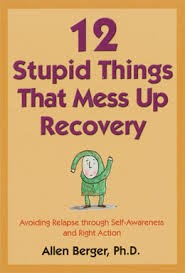 getting honest with ourselves and facing up to the self-defeating thoughts and actions that put our sobriety at risk. Although there are as many ways to mess up recovery as there are alcoholics and addicts, some general themes exist, which include confusing self-concern with selfishness not making amends using the program to try to become perfect not getting help for relationship troubles believing that life should be easy In simple, down-to-earth language, Allen Berger explores the twelve most commonly confronted beliefs and attitudes that can sabotage recovery. He then provides tools for working through these problems in daily life. This useful guide offers fresh perspectives on how the process of change begins with basic self-awareness and a commitment to working a daily program.
getting honest with ourselves and facing up to the self-defeating thoughts and actions that put our sobriety at risk. Although there are as many ways to mess up recovery as there are alcoholics and addicts, some general themes exist, which include confusing self-concern with selfishness not making amends using the program to try to become perfect not getting help for relationship troubles believing that life should be easy In simple, down-to-earth language, Allen Berger explores the twelve most commonly confronted beliefs and attitudes that can sabotage recovery. He then provides tools for working through these problems in daily life. This useful guide offers fresh perspectives on how the process of change begins with basic self-awareness and a commitment to working a daily program.
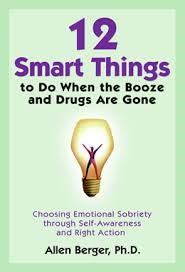 12 Smart Things to Do When the Booze and Drugs Are Gone: Choosing Emotional Sobriety through Self-Awareness and Right Action by Allen Berger, Ph.D. Whether it’s called “dry drunk” or “white knuckle sobriety,” it’s that stage in recovery when we realize that “putting the plug in the jug” isn’t enough. The next step is taking responsibility for the emotional immaturity that fuels our addictive personality and has a tremendous impact on ourselves and others. Allen Berger, PhD, draws on the teachings of Bill W. and psychotherapy pioneers to offer twelve hallmarks of emotional sobriety that, when practiced, give people the confidence to be accountable for their behavior, ask for what they want and need, and grow and develop a deeper trust in the process of life. These smart things include: understanding who you are and what’s important to you learning not to take others’ reactions personally trusting your inner compass taking responsibility for your reactions to problematic situations It is in these practices that we find release from what Bill W. described as an “absolute dependency” on people or circumstances, and develop the tools to find prestige, security, and belonging within. Dr. Berger is a talented clinical psychologist and popular recovery author who has written extensively about the experience of recovery, the important topic of emotional sobriety, integrating modern psychotherapy and the 12 Steps, and the psychological forces operating in the Twelve Steps. His books 12 Stupid Things that Mess Up Recovery, 12 Smart Things to do When the Booze and Drugs are Gone, 12 Hidden Rewards of Making Amends, and 12 More Stupid Things that Mess Up Recovery are bestsellers and recovery mainstays. You can learn more about Dr. Berger and his work at www.abphd.com .
12 Smart Things to Do When the Booze and Drugs Are Gone: Choosing Emotional Sobriety through Self-Awareness and Right Action by Allen Berger, Ph.D. Whether it’s called “dry drunk” or “white knuckle sobriety,” it’s that stage in recovery when we realize that “putting the plug in the jug” isn’t enough. The next step is taking responsibility for the emotional immaturity that fuels our addictive personality and has a tremendous impact on ourselves and others. Allen Berger, PhD, draws on the teachings of Bill W. and psychotherapy pioneers to offer twelve hallmarks of emotional sobriety that, when practiced, give people the confidence to be accountable for their behavior, ask for what they want and need, and grow and develop a deeper trust in the process of life. These smart things include: understanding who you are and what’s important to you learning not to take others’ reactions personally trusting your inner compass taking responsibility for your reactions to problematic situations It is in these practices that we find release from what Bill W. described as an “absolute dependency” on people or circumstances, and develop the tools to find prestige, security, and belonging within. Dr. Berger is a talented clinical psychologist and popular recovery author who has written extensively about the experience of recovery, the important topic of emotional sobriety, integrating modern psychotherapy and the 12 Steps, and the psychological forces operating in the Twelve Steps. His books 12 Stupid Things that Mess Up Recovery, 12 Smart Things to do When the Booze and Drugs are Gone, 12 Hidden Rewards of Making Amends, and 12 More Stupid Things that Mess Up Recovery are bestsellers and recovery mainstays. You can learn more about Dr. Berger and his work at www.abphd.com .
Sane: Mental Illness, Addiction, and the 12 Steps by Marya Hornbacher, offers an enlightening examination of the Twelve Steps for those with co-occurring addiction and mental health disorders. In this beautifully written recovery handbook, Hornbacher applies the wisdo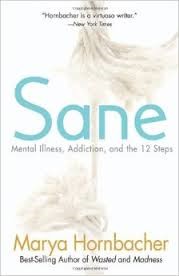 m earned from her struggle with a severe mental illness and addiction to offer an honest and illuminating examination of the Twelve Steps of Alcoholics Anonymous for those with co-occurring addiction and mental health disorders. Relaying her recovery experiences, and those of the people with whom she has shared her journey, Hornbacher guides readers through the maze of special issues that make working each Step a unique challenge for those with co-occurring disorders. She addresses the difficulty that many with a mental illness have with finding support in a recovery program that often discourages talk about emotional problems, and the therapy and medication that they require. At the same time, Hornbacher reveals how the Twelve Steps can offer insights, spiritual sustenance, and practical guidance to enhance stability for those who truly have to approach sanity and sobriety one day at a time.
m earned from her struggle with a severe mental illness and addiction to offer an honest and illuminating examination of the Twelve Steps of Alcoholics Anonymous for those with co-occurring addiction and mental health disorders. Relaying her recovery experiences, and those of the people with whom she has shared her journey, Hornbacher guides readers through the maze of special issues that make working each Step a unique challenge for those with co-occurring disorders. She addresses the difficulty that many with a mental illness have with finding support in a recovery program that often discourages talk about emotional problems, and the therapy and medication that they require. At the same time, Hornbacher reveals how the Twelve Steps can offer insights, spiritual sustenance, and practical guidance to enhance stability for those who truly have to approach sanity and sobriety one day at a time.
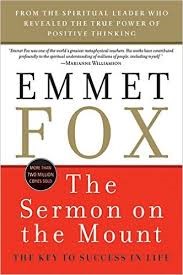 The Sermon on the Mount: The Key to Success in Life by Emmet Fox. What did Jesus teach? Distilled from years of study and lecture, affirmed by nearly a million readers over the last fifty years, Emmet Fox’s answer in The Sermon on the Mount is simple. The Bible is a “textbook of metaphysics” and the teachings of Jesus express–without dogma–a practical approach for the development of the soul and for the shaping of our lives into what we really wish them to be. For Fox, Jesus was “no sentimental dreamer, no mere dealer in empty platitudes, but the unflinching realist that only a great mystic can be.”In his most popular work, Emmet Fox shows how to: Understand the true nature of divine wisdom. Tap into the power of prayer. Develop a completely integrated and fully expressed personality. Transform negative attitudes into life-affirming beliefs. Claim our divine right to the full abundance of life.
The Sermon on the Mount: The Key to Success in Life by Emmet Fox. What did Jesus teach? Distilled from years of study and lecture, affirmed by nearly a million readers over the last fifty years, Emmet Fox’s answer in The Sermon on the Mount is simple. The Bible is a “textbook of metaphysics” and the teachings of Jesus express–without dogma–a practical approach for the development of the soul and for the shaping of our lives into what we really wish them to be. For Fox, Jesus was “no sentimental dreamer, no mere dealer in empty platitudes, but the unflinching realist that only a great mystic can be.”In his most popular work, Emmet Fox shows how to: Understand the true nature of divine wisdom. Tap into the power of prayer. Develop a completely integrated and fully expressed personality. Transform negative attitudes into life-affirming beliefs. Claim our divine right to the full abundance of life.
Drop the Rock: Removing Character Defects – Steps Six and Seven by Bill P., Todd W., & Sara S. Resentment. Fear. Self-Pity. Intolerance. Anger. As Bill P. explains, these are the “rocks” that can sink recovery- or at the least, block further progress. Based on the principl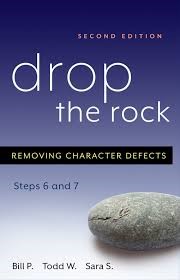 es behind Steps Six and Seven, Drop the Rock combines personal stories, practical advice, and powerful insights to help readers move forward in recovery. The second edition features additional stories and a reference section.
es behind Steps Six and Seven, Drop the Rock combines personal stories, practical advice, and powerful insights to help readers move forward in recovery. The second edition features additional stories and a reference section.
Broken: My Story of Addiction and Redemption by William Cope Moyers & Katherine K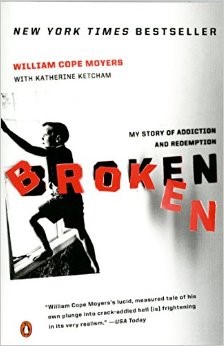 etcham William Cope Moyers has come a long, long way. In 1994, he lay on the floor of an Atlanta crack house. His father had put together a search party. His worried family waited at home where Moyers had left them when he embarked on yet another binge. From that lowly, drug-hazed night, Moyers went on to become an executive at the Hazelden Foundation and travels far and wide to talk about addiction and treatment. Broken tells the story of what happened between then and now—from growing up the privileged son of Bill Moyers to his descent into alcoholism and drug addiction, his numerous stabs at getting clean, his many relapses, and how he managed to survive. Harrowing and wrenching, Broken paints a picture of a man with every advantage who nonetheless found himself spiraling into a dark and life-threatening abyss. But unlike other memoirs of its kind, Broken emerges into the clear light of Moyers’s recovery as he dedicates his life to changing the politics of addiction. Beautifully written with a deep underlying spirituality, this is a missive of hope for the scores of Americans struggling with addiction—and an honest and inspiring account that proves the spiritual insight that we are strongest at the broken places.
etcham William Cope Moyers has come a long, long way. In 1994, he lay on the floor of an Atlanta crack house. His father had put together a search party. His worried family waited at home where Moyers had left them when he embarked on yet another binge. From that lowly, drug-hazed night, Moyers went on to become an executive at the Hazelden Foundation and travels far and wide to talk about addiction and treatment. Broken tells the story of what happened between then and now—from growing up the privileged son of Bill Moyers to his descent into alcoholism and drug addiction, his numerous stabs at getting clean, his many relapses, and how he managed to survive. Harrowing and wrenching, Broken paints a picture of a man with every advantage who nonetheless found himself spiraling into a dark and life-threatening abyss. But unlike other memoirs of its kind, Broken emerges into the clear light of Moyers’s recovery as he dedicates his life to changing the politics of addiction. Beautifully written with a deep underlying spirituality, this is a missive of hope for the scores of Americans struggling with addiction—and an honest and inspiring account that proves the spiritual insight that we are strongest at the broken places.
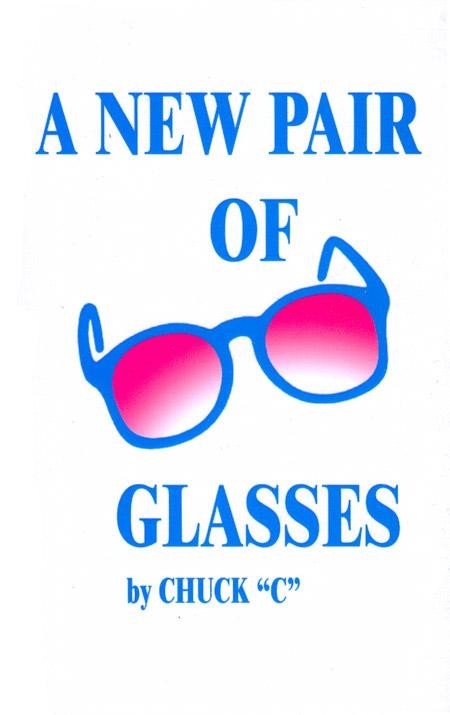 A New Pair of Glasses Paperback by Chuck “C” (Chamberlain) A few years ago I read the book A New Pair of Glasses, which is basically the transcript of a weekend-long AA talk given by Chuck C. in the mid-70’s. It was an awesome book and I was really impressed with his program and his spirituality. This man’s spirituality is just totally amazing ……There are many ways to the top of the mountain, but the view is always the same.
A New Pair of Glasses Paperback by Chuck “C” (Chamberlain) A few years ago I read the book A New Pair of Glasses, which is basically the transcript of a weekend-long AA talk given by Chuck C. in the mid-70’s. It was an awesome book and I was really impressed with his program and his spirituality. This man’s spirituality is just totally amazing ……There are many ways to the top of the mountain, but the view is always the same.
Breathing Under Water: Spirituality and the Twelve Steps Paperback – by Richard Rohr O.F.M. We are all addicted in some way. When we learn to identify our addiction, embrace our brokenness, and surrend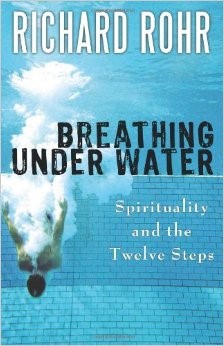 er to God, we begin to bring healing to ourselves and our world. In Breathing Under Water, Richard Rohr shows how the gospel principles in the Twelve Steps can free anyone from any addiction—from an obvious dependence on alcohol or drugs to the more common but less visible addiction that we all have to sin. Fr. Richard Rohr is a globally recognized ecumenical teacher bearing witness to the universal awakening within Christian mysticism and the Perennial Tradition. He is a Franciscan priest of the New Mexico Province and founder of the Center for Action and Contemplation (CAC) in Albuquerque, New Mexico. Fr. Richard’s teaching is grounded in the Franciscan alternative orthodoxy—practices of contemplation and lived kenosis (self-emptying), expressing itself in radical compassion, particularly for the socially marginalized.
er to God, we begin to bring healing to ourselves and our world. In Breathing Under Water, Richard Rohr shows how the gospel principles in the Twelve Steps can free anyone from any addiction—from an obvious dependence on alcohol or drugs to the more common but less visible addiction that we all have to sin. Fr. Richard Rohr is a globally recognized ecumenical teacher bearing witness to the universal awakening within Christian mysticism and the Perennial Tradition. He is a Franciscan priest of the New Mexico Province and founder of the Center for Action and Contemplation (CAC) in Albuquerque, New Mexico. Fr. Richard’s teaching is grounded in the Franciscan alternative orthodoxy—practices of contemplation and lived kenosis (self-emptying), expressing itself in radical compassion, particularly for the socially marginalized.
One Breath at a Time: Buddhism and the Twelve Steps Paperback – by Kevin Griffin. What would the Buddha sa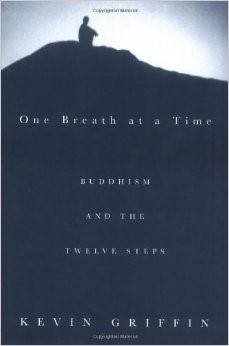 y to an alcoholic or addict? What could those in recovery offer to the Buddhist path? Kevin Griffin has immersed himself in the Buddhist and Twelve Step traditions, and in One Breath at a Time he gives some surprising and inspiring answers to these questions. The author, a Buddhist meditation teacher and longtime Twelve Step practitioner, weaves his personal story of recovery with traditional Buddhist teachings. The book takes us on a journey through the Steps, examining critical Twelve Step ideas like Powerlessness, Higher Power, and Moral Inventory through the lens of Buddhism. One Breath at a Time presents potent ancient techniques for finding calm and clarity and offers a vision of a Higher Power not tied to traditional Western Judeo-Christian concepts. One Breath at a Time, describes the convergence of two vital traditions, one ancient, the other contemporary, and shows how they are working together to create a rich spiritual path for our times. Certain to resonate with both meditators and those whose mantra is “One day at a time,” One Breath at a Time should find a large, welcoming audience.
y to an alcoholic or addict? What could those in recovery offer to the Buddhist path? Kevin Griffin has immersed himself in the Buddhist and Twelve Step traditions, and in One Breath at a Time he gives some surprising and inspiring answers to these questions. The author, a Buddhist meditation teacher and longtime Twelve Step practitioner, weaves his personal story of recovery with traditional Buddhist teachings. The book takes us on a journey through the Steps, examining critical Twelve Step ideas like Powerlessness, Higher Power, and Moral Inventory through the lens of Buddhism. One Breath at a Time presents potent ancient techniques for finding calm and clarity and offers a vision of a Higher Power not tied to traditional Western Judeo-Christian concepts. One Breath at a Time, describes the convergence of two vital traditions, one ancient, the other contemporary, and shows how they are working together to create a rich spiritual path for our times. Certain to resonate with both meditators and those whose mantra is “One day at a time,” One Breath at a Time should find a large, welcoming audience.
The 12-Step Buddhist: Enhance Recovery from Any Addiction Author Darren Littlejohn has been there and back, and presents a complimentary guide for recovery to the traditional twelve-step program, out of his own struggles and successes through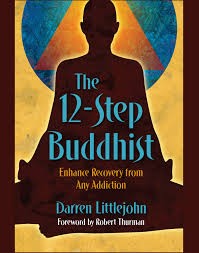 the study of Zen and Tibetan Buddhism. The face of addiction and alcoholism is a face that many have seen before — it may be a celebrity, a colleague, or even a family member. And though the 12-step program by itself can often bring initial success, many addicts find themselves relapsing back into old ways and old patterns, or replacing one addiction with another. Working with the traditional 12-Step philosophy, the author first shares his own life path, and how he came to find the spiritual solace that has greatly enhanced his life in recovery. Then, he details out how his work integrating Buddhism into the traditional twelve-step programs validates both aspects of the recovery process. While being careful not to present himself as a Tibetan lama or Zen master, the author shows how each step — such as admitting there is a problem, seeking help, engaging in a thorough self-examination, making amends for harm done, and helping other drug addicts who want to recover — fits into the Bodhisattva path. This integration makes Buddhism accessible for addicts, and the 12 Steps understandable for Buddhists who may otherwise be at a loss to help those in need. The 12-Step Buddhist is designed to be a complimentary practice to the traditional 12-step journey, not a replacement. While traditional twelve-step programs help addicts become sober by removing the drug of choice and providing a spiritual path, they rarely delve deep into what causes people to suffer in the first place. The integration of Buddhism with the traditional process provides the wisdom and meditations that can help addicts truly find a deep, spiritual liberation from all causes and conditions of suffering — for good.
the study of Zen and Tibetan Buddhism. The face of addiction and alcoholism is a face that many have seen before — it may be a celebrity, a colleague, or even a family member. And though the 12-step program by itself can often bring initial success, many addicts find themselves relapsing back into old ways and old patterns, or replacing one addiction with another. Working with the traditional 12-Step philosophy, the author first shares his own life path, and how he came to find the spiritual solace that has greatly enhanced his life in recovery. Then, he details out how his work integrating Buddhism into the traditional twelve-step programs validates both aspects of the recovery process. While being careful not to present himself as a Tibetan lama or Zen master, the author shows how each step — such as admitting there is a problem, seeking help, engaging in a thorough self-examination, making amends for harm done, and helping other drug addicts who want to recover — fits into the Bodhisattva path. This integration makes Buddhism accessible for addicts, and the 12 Steps understandable for Buddhists who may otherwise be at a loss to help those in need. The 12-Step Buddhist is designed to be a complimentary practice to the traditional 12-step journey, not a replacement. While traditional twelve-step programs help addicts become sober by removing the drug of choice and providing a spiritual path, they rarely delve deep into what causes people to suffer in the first place. The integration of Buddhism with the traditional process provides the wisdom and meditations that can help addicts truly find a deep, spiritual liberation from all causes and conditions of suffering — for good.
 Radical Acceptance: Embracing Your Life With the Heart of a Buddha by Tara Brach “Believing that something is wrong with us is a deep and tenacious suffering,” says Tara Brach at the start of this illuminating book. This suffering emerges in crippling self-judgments and conflicts in our relationships, in addictions and perfectionism, in loneliness and overwork–all the forces that keep our lives constricted and unfulfilled. Radical Acceptance offers a path to freedom, including the day-to-day practical guidance developed over Dr. Brach’s twenty years of work with therapy clients and Buddhist students. Writing with great warmth and clarity, Tara Brach brings her teachings alive through personal stories and case histories, fresh interpretations of Buddhist tales, and guided meditations. Step by step, she leads us to trust our innate goodness, showing how we can develop the balance of clear-sightedness and compassion that is the essence of Radical Acceptance. Radical Acceptance does not mean self-indulgence or passivity. Instead it empowers genuine change: healing fear and shame and helping to build loving, authentic relationships. When we stop being at war with ourselves, we are free to live fully every precious moment of our lives.
Radical Acceptance: Embracing Your Life With the Heart of a Buddha by Tara Brach “Believing that something is wrong with us is a deep and tenacious suffering,” says Tara Brach at the start of this illuminating book. This suffering emerges in crippling self-judgments and conflicts in our relationships, in addictions and perfectionism, in loneliness and overwork–all the forces that keep our lives constricted and unfulfilled. Radical Acceptance offers a path to freedom, including the day-to-day practical guidance developed over Dr. Brach’s twenty years of work with therapy clients and Buddhist students. Writing with great warmth and clarity, Tara Brach brings her teachings alive through personal stories and case histories, fresh interpretations of Buddhist tales, and guided meditations. Step by step, she leads us to trust our innate goodness, showing how we can develop the balance of clear-sightedness and compassion that is the essence of Radical Acceptance. Radical Acceptance does not mean self-indulgence or passivity. Instead it empowers genuine change: healing fear and shame and helping to build loving, authentic relationships. When we stop being at war with ourselves, we are free to live fully every precious moment of our lives.
True Refuge: Finding Peace and Freedom in Your Own Awakened Heart by Tara Brach How do you cope when facing life-threatening illness, family conflict, faltering relationships, old trauma, obsessive thinking, overwhelming emotion, or inevitable loss? If 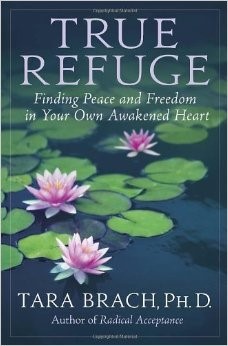 you’re like most people, chances are you react with fear and confusion, falling back on timeworn strategies: anger, self-judgment, and addictive behaviors. Though these old, conditioned attempts to control our life may offer fleeting relief, ultimately they leave us feeling isolated and mired in pain. There is another way. Beneath the turbulence of our thoughts and emotions exists a profound stillness, a silent awareness capable of limitless love. Tara Brach, author of the award-winning Radical Acceptance, calls this awareness our true refuge, because it is available to every one of us, at any moment, no exceptions. In this book, Brach offers a practical guide to finding our inner sanctuary of peace and wisdom in the midst of difficulty. Based on a fresh interpretation of the three classic Buddhist gateways to freedom—truth, love, and awareness—True Refuge shows us the way not just to heal our suffering, but also to cultivate our capacity for genuine happiness. Through spiritual teachings, guided meditations, and inspirational stories of people who discovered loving presence during times of great struggle, Brach invites us to connect more deeply with our own inner life, one another, and the world around us.
you’re like most people, chances are you react with fear and confusion, falling back on timeworn strategies: anger, self-judgment, and addictive behaviors. Though these old, conditioned attempts to control our life may offer fleeting relief, ultimately they leave us feeling isolated and mired in pain. There is another way. Beneath the turbulence of our thoughts and emotions exists a profound stillness, a silent awareness capable of limitless love. Tara Brach, author of the award-winning Radical Acceptance, calls this awareness our true refuge, because it is available to every one of us, at any moment, no exceptions. In this book, Brach offers a practical guide to finding our inner sanctuary of peace and wisdom in the midst of difficulty. Based on a fresh interpretation of the three classic Buddhist gateways to freedom—truth, love, and awareness—True Refuge shows us the way not just to heal our suffering, but also to cultivate our capacity for genuine happiness. Through spiritual teachings, guided meditations, and inspirational stories of people who discovered loving presence during times of great struggle, Brach invites us to connect more deeply with our own inner life, one another, and the world around us.
